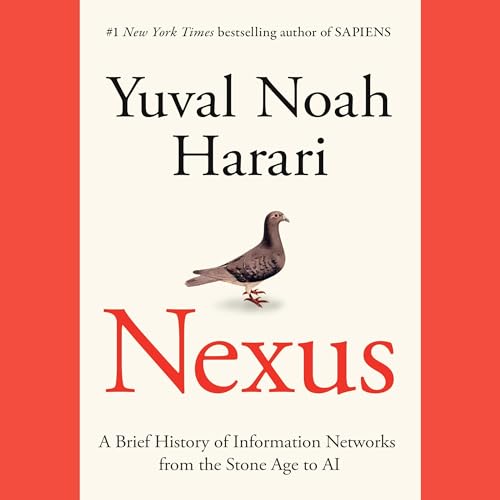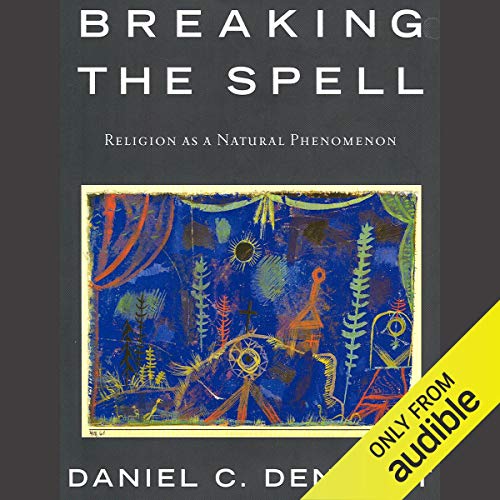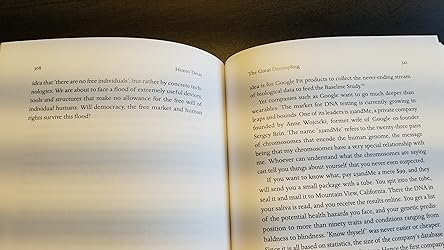
 Audible sample
Audible sample  Playing...
Playing... 
 Paused
Paused  Your audiobook is waiting!
Your audiobook is waiting!
Enjoy a free trial on us
$0.00$0.00
- Click above for unlimited listening to select audiobooks, Audible Originals, and podcasts.
- One credit a month to pick any title from our entire premium selection — yours to keep (you'll use your first credit now).
- You will get an email reminder before your trial ends.
- $14.95$14.95 a month after 30 days. Cancel online anytime.
Buy
-12% $26.96$26.96
Homo Deus: A Brief History of Tomorrow
 Audible Audiobook
– Unabridged
Audible Audiobook
– Unabridged
Yuval Noah Harari, author of the critically acclaimed New York Times best seller and international phenomenon Sapiens, returns with an equally original, compelling, and provocative book, turning his focus toward humanity's future and our quest to upgrade humans into gods.
Over the past century, humankind has managed to do the impossible and rein in famine, plague, and war. This may seem hard to accept, but as Harari explains in his trademark style - thorough yet riveting - famine, plague, and war have been transformed from incomprehensible and uncontrollable forces of nature into manageable challenges. For the first time ever, more people die from eating too much than from eating too little; more people die from old age than from infectious diseases; and more people commit suicide than are killed by soldiers, terrorists, and criminals put together. The average American is 1,000 times more likely to die from binging at McDonalds than from being blown up by Al Qaeda.
What then will replace famine, plague, and war at the top of the human agenda? As the self-made gods of planet Earth, what destinies will we set ourselves, and which quests will we undertake? Homo Deus explores the projects, dreams, and nightmares that will shape the 21st century - from overcoming death to creating artificial life. It asks the fundamental questions: Where do we go from here? And how will we protect this fragile world from our own destructive powers? This is the next stage of evolution. This is Homo Deus.
With the same insight and clarity that made Sapiens an international hit and a New York Times best seller, Harari maps out our future.
- Listening Length14 hours and 54 minutes
- Audible release dateFebruary 21, 2017
- LanguageEnglish
- ASINB01MYZ4OUW
- VersionUnabridged
- Program TypeAudiobook
 Read & Listen
Read & Listen
Get the Audible audiobook for the reduced price of $12.99 after you buy the Kindle book.
People who viewed this also viewed
- Audible Audiobook
- Audible Audiobook
- Sapiens. De animales a dioses [Sapiens: From Animals to Gods]: Una breve historia de la humanidad [A Brief History of Humankind]
![Sapiens. De animales a dioses [Sapiens: From Animals to Gods]: Una breve historia de la humanidad [A Brief History of Hum...](https://images-na.ssl-images-amazon.com/images/G/01/x-locale/common/grey-pixel.gif) Audible Audiobook
Audible Audiobook - Audible Audiobook
- Audible Audiobook
People who bought this also bought
- Audible Audiobook
- Audible Audiobook
- Audible Audiobook
- Audible Audiobook
- Audible Audiobook
Related to this topic
- Audible Audiobook
- Audible Audiobook
- Audible Audiobook
- Audible Audiobook
- Audible Audiobook
Product details
| Listening Length | 14 hours and 54 minutes |
|---|---|
| Author | Yuval Noah Harari |
| Narrator | Derek Perkins |
| Whispersync for Voice | Ready |
| Audible.com Release Date | February 21, 2017 |
| Publisher | HarperAudio |
| Program Type | Audiobook |
| Version | Unabridged |
| Language | English |
| ASIN | B01MYZ4OUW |
| Best Sellers Rank | #1,235 in Audible Books & Originals (See Top 100 in Audible Books & Originals) #3 in Evolution (Audible Books & Originals) #3 in Future Studies #4 in History of Civilization |
Customer reviews
Customer Reviews, including Product Star Ratings help customers to learn more about the product and decide whether it is the right product for them.
To calculate the overall star rating and percentage breakdown by star, we don’t use a simple average. Instead, our system considers things like how recent a review is and if the reviewer bought the item on Amazon. It also analyzed reviews to verify trustworthiness.
Learn more how customers reviews work on AmazonReviews with images
-
Top reviews
Top reviews from the United States
There was a problem filtering reviews right now. Please try again later.
This quote from page 15 may serve as a point of departure: “Previously the main sources of wealth were material assets such as gold mines, wheat fields and oil fields. Today the main source of wealth is knowledge.” (p. 15)
In the latter part of the book Harari defines this knowledge more precisely as algorithms. We and all the plants in the ground and all fish in the sea are biological algorithms. There is no “self,” no free will, no individuals (he says we are “dividuals”) no God in the sky, and by the way, humans as presently constituted are toast.
The interesting thing about all this from my point of view is that I agree almost completely. I came to pretty much the same conclusions in my book, “The World Is Not as We Think It Is” several years ago.
What I want to do in this review is present a number of quotes from the book and make brief comments on them, or just let them speak for themselves. In this manner I think the reader can see how beautifully Harari writes and how deep and original a thinker he is.
“Islamic fundamentalists could never have toppled Saddam Hussein by themselves. Instead they enraged the USA by the 9/11 attacks, and the USA destroyed the Middle Eastern china shop for them. Now they flourish in the wreckage.” (p. 19) Notice “fundamentalists” instead of “terrorists.” This is correct because ISIS, et al., have been financed by Muslim fundamentalists in places like Saudi Arabia.
“You want to know how super-intelligent cyborgs might treat ordinary flesh-and-blood humans? Better start by investigating how humans treat their less intelligent animal cousins.” (p. 67)
Harari speaks of a “web of meaning” and posits, “To study history means to watch the spinning and unravelling of these webs, and to realise that what seems to people in one age the most important thing in life becomes utterly meaningless to their descendants.” (p. 147)
One of the themes begun in “Sapiens” and continued here is the idea that say 20,000 years ago humans were not only better off than they were in say 1850, but smarter than they are today. (See e.g., page 176 and also page 326 where Harari writes that it would be “immensely difficult to design a robotic hunter-gatherer” because of the great many skills that would have to be learned.) In “The World Is Not as We Think It Is” I express it like this: wild animals are smarter than domesticated animals; humans have domesticated themselves.
For Harari Nazism, Communism, “liberalism” humanism, etc. are religions. I put “liberalism” in quotes because Harari uses the term in a historical sense not as the opposite of conservatism in the contemporary parlance.
“For religions, spirituality is a dangerous threat.” (p. 186) I would add that religions are primarily social and political organizations.
“If I invest $100 million searching for oil in Alaska and I find it, then I now have more oil, but my grandchildren will have less of it. In contrast, if I invest $100 million researching solar energy, and I find a new and more efficient way of harnessing it, then both I and my grandchildren will have more energy.” (p. 213)
“The greatest scientific discovery was the discovery of ignorance.” (p. 213)
On global warming: “Even if bad comes to worse and science cannot hold off the deluge, engineers could still build a hi-tech Noah’s Ark for the upper caste, while leaving billions of others to drown….” (p. 217)
“More than a century after Nietzsche pronounced Him dead, God seems to be making a comeback. But this is a mirage. God is dead—it’s just taking a while to get rid of the body.” (p. 270)
“…desires are nothing but a pattern of firing neurons.” (p. 289)
Harari notes that a cyber-attack might shut down the US power grid, cause industrial accidents, etc., but also “wipe out financial records so that trillions of dollars simply vanish without a trace and nobody knows who owns what.” (p. 312) Now THAT ought to scare the bejesus out of certain members of the one percent!
On the nature of unconscious cyber beings, Harari asserts that for armies and corporations “intelligence is mandatory but consciousness is optional.” (p. 314) This seems obvious but I would like to point out that what “consciousness” is is unclear and poorly defined.
While acknowledging that we’re not there yet, Harari thinks it’s possible that future fMRI machines could function as “almost infallible truth machines.” Add this to all the knowledge that Facebook and Google have on each of us and you might get a brainstorm: totalitarianism for humans as presently constituted is inevitable.
One of conundrums of the not too distance future is what are we going to do with all the people who do not have jobs, the unemployable, what Harari believes may be called the “useless class”? Answer found elsewhere: a guaranteed minimum income (GMI). Yes, with cheap robotic labor and AI, welfare is an important meme of the future.
Harari speculates on pages 331 and 332 that artificial intelligence might “exterminate human kind.” Why? For fear humans will pull the plug. Harari mentions “the motivation of a system smarter than” humans. My problem with this is that machines, unless it is programmed in, have no motivations. However it could be argued that they must be programmed in such a way as to maintain themselves. In other words they do have a motivation. Recently I discussed this with a friend and we came to the conclusion that yes the machines will protect themselves and keep on keeping on, but they would not reproduce themselves because new machines would be taking resources from themselves.
Harari believes that we have “narrating selves” that spew out stories about why we do what we do, narratives that direct our behavior. He believes that with the mighty algorithms to come—think Google, Microsoft and Facebook being a thousand times more invasive and controlling so that they know more about us than we know about ourselves. Understanding this we will have to realize that we are “integral parts of a huge global network” and not individuals. (See e.g., page 343)
Harari even sees Google voting for us (since it will know our desires and needs better than we do). (p. 344) After the election of Trump in which some poor people voted to help billionaires get richer and themselves poorer, I think perhaps democracy as presently practiced may go the way of the dodo.
An interesting idea taking this further is to imagine as Harari does that Google, Facebook, et al. in say the personification of Microsoft’s Cortana, become first oracles, then agents for us and finally sovereigns. God is dead. Long live God. Along the way we may find that the books you read “will read you while you reading them.” (p. 349)
In other words what is coming are “techno-religions” which Harari sees as being of two types: “techno-humanism and data religion.” He writes that “the most interesting place in the world from a religious perspective is…Silicon Valley.” (p. 356)
The last chapter in the book, Chapter 11 is entitled “The Data Religion” in which the Dataists create the “Internet-of-All-Things.” Harari concludes, “Once this mission is accomplished, Homo sapiens will vanish.” (p. 386)
--Dennis Littrell, author of “Hard Science and the Unknowable”
Premise: The New Human Agenda
In Chapter 1, Harari suggests that there is an entirely new agenda for human beings. What will we strive for? We have never settled for our achievements but rather we crave for more, better, faster, different.
“And having raised humanity above the beastly level of survival struggles, we will now aim to upgrade humans into gods, and turn Homo sapiens into Homo deus.”—Harari, Yuval Noah. Homo Deus: A Brief History of Tomorrow (p. 21). HarperCollins. Kindle Edition.
The hypothesis is that we will not be satisfied to do any less than continue down the path that technology and so-called Artificial Intelligence is paving for us.
Part I: Homo Sapiens Conquers the World
In Chapters 2 & 3, Harari takes us through a brief history of the Anthropocene period and how the human “spark” ignited the creation of a totally new world. He asks three provocative questions, and then goes about answering them:
What is the difference between humans and all other animals?
How did our species conquer the world?
Is Homo sapiens a superior life form, or just the local bully?
From these questions and Harari’s astute observations, we learn that no matter what we think, we humans will shape our world and create a religion to follow. What will the next religion be?
Part II: Homo Sapiens Gives Meaning to the World
Again, three questions set up this section of the book:
What kind of world did humans create?
How did humans become convinced that they not only control the world, but also give it meaning?
How did humanism – the worship of humankind – become the most important religion of all?
In Chapters 4 through 7 Harari takes us through the history of how humans created meaning for themselves through a framework of beliefs we call religion. From the storytellers to the Humanist revolution, we see how Homo sapiens wrestle with nature and human nature for control and destiny.
“Yet in fact modernity is a surprisingly simple deal. The entire contract can be summarised in a single phrase: humans agree to give up meaning in exchange for power.” (p. 199)
Part III: Homo Sapiens Loses Control
Up until this section, Harari spent most of his time discussing how we got to where we find ourselves today. And now we find several hypotheses or scenarios for the future. And as usual, three questions:
Can humans go on running the world and giving it meaning?
How do biotechnology and artificial intelligence threaten humanism?
Who might inherit humankind, and what new religion might replace humanism?
Chapters 8 through 11 takes us on a journey from the time bomb in the laboratory (no free will) to the new Data Religion.
“For example, when a neuron fires an electric charge, this may be either a deterministic reaction to external stimuli, or perhaps the outcome of a random event such as the spontaneous decomposition of a radioactive atom. Neither option leaves any room for free will. Decisions reached through a chain reaction of biochemical events, each determined by a previous event, are certainly not free. Decisions resulting from random subatomic accidents aren’t free either; they are just random. And when random accidents combine with deterministic processes, we get probabilistic outcomes, but this too doesn’t amount to freedom.” (pp. 282-283)
In other words, “Free will exists only in the imaginary stories we humans have invented.” This undermines the story we tell about our liberal philosophy and also undermines the concept of the individual.
A scenario for the future is that we humans will become gods in our own minds—for a while at least. Harari suggests that, “Since intelligence is decoupling from consciousness, and since non-conscious intelligence is developing at breakneck speed, humans must actively upgrade their minds if they want to stay in the game.” He calls this new religion “Techno-humanism.”
Dataism
In Chapter 11, Harari introduces Dataism.
Dataism declares that the universe consists of data flows, and the value of any phenomenon or entity is determined by its contribution to data processing. This may strike you as some eccentric fringe notion, but in fact it has already conquered most of the scientific establishment. (p. 367)
Dataism declares that organisms are algorithms. And, Harari states, that this is the current scientific dogma. He goes on to say that, “If humankind is indeed a single data-processing system, what is its output? Dataists would say that its output will be the creation of a new and even more efficient data-processing system, called the Internet-of-All-Things. Once this mission is accomplished, Homo sapiens will vanish.”
Read This Book!
No short review can do this book justice. It is my opinion that we all need to be thinking deeply about this topic. Where are we humans taking our species? How will we find meaning in the future? I leave you with one last quotation from the book:
“Sapiens evolved in the African savannah tens of thousands of years ago, and their algorithms are just not built to handle twenty-first-century data flows. We might try to upgrade the human data-processing system, but this may not be enough. The Internet-of-All-Things may soon create such huge and rapid data flows that even upgraded human algorithms would not be able to handle them. When cars replaced horse-drawn carriages, we didn’t upgrade the horses – we retired them. Perhaps it is time to do the same with Homo sapiens.”—Harari, Yuval Noah. Homo Deus: A Brief History of Tomorrow (p. 388). HarperCollins. Kindle Edition.
I hope you will get the book and make time to give it a thoughtful reading.





![Sapiens. De animales a dioses [Sapiens: From Animals to Gods]: Una breve historia de la humanidad [A Brief History of Hum...](https://m.media-amazon.com/images/I/41qQE6a22GL.jpg)

























